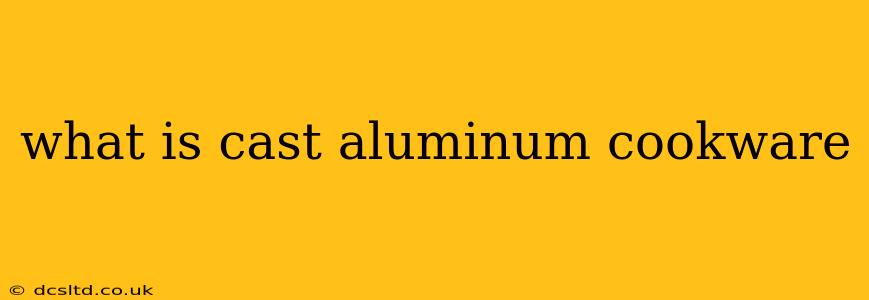Cast aluminum cookware is a popular choice among home cooks and professional chefs alike, prized for its exceptional heat distribution and durability. But what exactly makes it stand out? Let's delve into the specifics of this versatile material and explore its benefits and drawbacks.
Cast aluminum cookware is created by pouring molten aluminum into a mold, allowing it to cool and solidify into its final shape. This process results in a sturdy, thick-bottomed piece of cookware with excellent heat retention and even cooking. Unlike other aluminum cookware, which is often made from thin sheets of aluminum, cast aluminum's thicker construction contributes significantly to its superior performance.
Why Choose Cast Aluminum? The Advantages
Several key advantages make cast aluminum a favorite among culinary enthusiasts:
-
Superior Heat Distribution: The dense structure of cast aluminum allows for incredibly even heat distribution across the entire cooking surface. This minimizes hot spots, ensuring consistent cooking and preventing food from burning or sticking. Say goodbye to unevenly cooked pancakes!
-
Excellent Heat Retention: Cast aluminum retains heat remarkably well, meaning your food stays warm even after you remove it from the heat source. This is perfect for dishes that require slow cooking or simmering.
-
Durability and Longevity: Cast aluminum is incredibly durable and can withstand years of regular use. It's resistant to warping and bending, unlike thinner aluminum cookware. With proper care, a set of cast aluminum cookware can last a lifetime.
-
Versatility: Cast aluminum cookware is suitable for various cooking methods, including stovetop cooking, oven baking, and even broiling (check manufacturer recommendations). This versatility makes it a true workhorse in the kitchen.
-
Affordable Option: While higher-end cast iron options can be quite expensive, cast aluminum generally presents a more affordable alternative, offering comparable performance in many aspects.
What are the Drawbacks of Cast Aluminum Cookware?
While cast aluminum offers many advantages, it's important to be aware of its limitations:
-
Weight: Cast aluminum cookware is heavier than other types of cookware, such as stainless steel or nonstick. This can be a drawback for some users, especially those with limited strength or mobility.
-
Reactivity: While generally less reactive than some other metals, cast aluminum can react with acidic foods, potentially affecting the taste or appearance of your dishes. Using a non-reactive liner (like a ceramic coating) often mitigates this concern.
-
Maintenance: While durable, cast aluminum does require some care and cleaning. Abrasive cleaners and scouring pads should be avoided to prevent scratching the surface.
What's the Difference Between Cast Aluminum and Other Cookware?
Many people compare cast aluminum to other materials, like cast iron and stainless steel. Here's a quick comparison:
-
Cast Aluminum vs. Cast Iron: Cast iron retains heat even better than cast aluminum but is significantly heavier and requires more seasoning and maintenance. Cast aluminum heats up faster.
-
Cast Aluminum vs. Stainless Steel: Stainless steel is lighter and easier to clean than cast aluminum, but it doesn't distribute heat as evenly.
Is Cast Aluminum Cookware Safe?
Yes, cast aluminum cookware is generally considered safe for cooking. However, you should avoid using abrasive cleaners and metal utensils that could scratch the surface. Also, be mindful of the potential for reaction with highly acidic foods, and consider using a non-reactive liner if necessary.
How Do I Clean Cast Aluminum Cookware?
Cleaning cast aluminum cookware is relatively straightforward. Hand washing with warm, soapy water is generally recommended. Avoid abrasive cleaners and scouring pads, as these can damage the surface. For stubborn food residue, soak the cookware in warm, soapy water before scrubbing gently with a non-abrasive sponge or cloth.
What Types of Cast Aluminum Cookware are Available?
Cast aluminum cookware comes in a wide variety of shapes and sizes, from skillets and saucepans to Dutch ovens and woks. You'll find options with and without non-stick coatings, depending on your cooking style and preferences.
In conclusion, cast aluminum cookware provides an excellent balance of durability, heat distribution, and affordability. Understanding its strengths and weaknesses will help you determine if it's the right choice for your kitchen.
